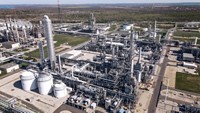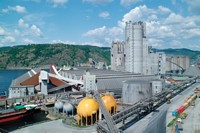Advertisement
Grab your lab coat. Let's get started
Welcome!
Welcome!
Create an account below to get 6 C&EN articles per month, receive newsletters and more - all free.
It seems this is your first time logging in online. Please enter the following information to continue.
As an ACS member you automatically get access to this site. All we need is few more details to create your reading experience.
Not you? Sign in with a different account.
Not you? Sign in with a different account.
ERROR 1
ERROR 1
ERROR 2
ERROR 2
ERROR 2
ERROR 2
ERROR 2
Password and Confirm password must match.
If you have an ACS member number, please enter it here so we can link this account to your membership. (optional)
ERROR 2
ACS values your privacy. By submitting your information, you are gaining access to C&EN and subscribing to our weekly newsletter. We use the information you provide to make your reading experience better, and we will never sell your data to third party members.
Business
Shortage of food-grade CO₂ threatens the UK
Record natural gas prices trigger supply chain crisis affecting foods and beverages
by Alex Scott
September 22, 2021
| A version of this story appeared in
Volume 99, Issue 35

A surge in natural gas prices in the UK is rippling through the economy, temporarily shutting down a fertilizer plant and threatening the availability of meats and packaged food.
Faced with high prices for natural gas, CF Industries idled two British ammonia plants on Sept. 15. And because the plants also supply 60% of the UK’s food-grade CO2, the closures put some of the country’s food industry in danger of seizing up.
A food production crisis has been averted, at least for now. CF is restarting the ammonia plants after the UK government agreed to subsidize them for the next 3 weeks. Officials aren’t specifying how much they are paying CF, but UK Environment Secretary George Eustice told the BBC’s Radio 4 program that “It’s into the millions.”
Farming and food groups are calling on the UK government to make structural changes to support a more robust supply chain for food-grade CO2 to avoid a repeat of the crisis, which was caused by an energy shortage stemming in part from a lack of wind-generated electricity.
“While it’s good to hear there may be an agreement in principle that production at the fertilizer factories may restart, with resulting CO2 supplies, it’s important this restart is meaningful and sustained,” Minette Batters, president of the National Farmers’ Union of England and Wales, says in a statement. “Users of carbon dioxide were given little to no warning that supplies were going to be cut off.”
UK slaughterhouses use CO2 to stun millions of animals each week, and without it they can’t accept shipments from farmers. CO2 is also widely used to fill food packages to extend their shelf life, and it is the gas that goes into fizzy drinks.
The price of natural gas in the UK has tripled since the start of the year and is now five times that of the US. UK natural gas production is down 28% so far this year compared with 2020, according to the consulting firm Wood Mackenzie. Record high coal prices, booming Asian natural gas demand, and limited growth in supplies from Russia have added to the problem, Wood Mackenzie states.
Food-grade CO2 shortages could extend beyond the UK. High natural gas prices in mainland Europe in the past week caused the fertilizer producer Yara International to cut its European ammonia production by about 40%.
The record gas prices are affecting other segments of the chemical industry as well. For example, Huntsman recently announced that it has added a natural gas surcharge of about $150 per metric ton on the methylene diphenyl diisocyanate, a polyurethane intermediate, it sells in Europe, Africa, the Middle East, and India.




Join the conversation
Contact the reporter
Submit a Letter to the Editor for publication
Engage with us on Twitter